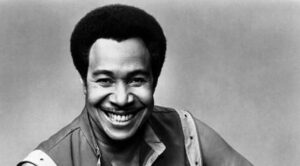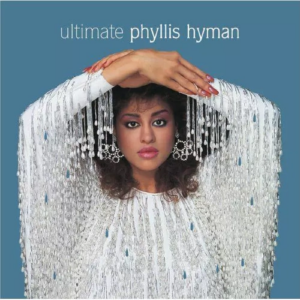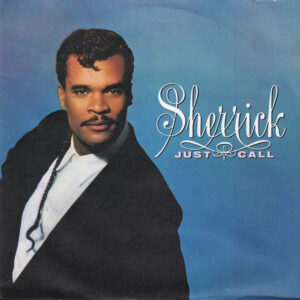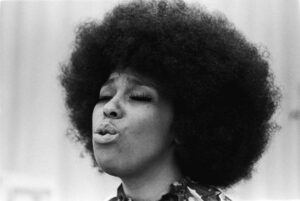As a recording artist, 19 years is a long time to be gone from the mainstream. Longer still is the 23 years it’s been since Jennifer Holliday’s last secular album, 1991’s I’m On Your Side. It helped that during those years, Holliday’s work was licensed on scores of compilation projects and two independent gospel projects gave her new lanes to play. Her publicly televised appearances were an annual affair one could almost set your watch to—including some rather iconic performances for the White House, Ally McBeal showcases and a movie version of Dreamgirls introduced her gifts to a whole new generation who has only known a svelte Holliday, one who was also a favorite staple on the gospel and Broadway cabaret circuit. In other words, Holliday never really went anywhere, from our hearts or presence. Whether that translates to a new audience for a brand new secular project, The Song Is You, from the vet of stage and screen depends on how much you love Holliday’s particular brand of torch song theatrics and appreciate the way she works around a somewhat different instrument than the one we first met when she was just 19 years old.
All voices change and evolve with time, and so it is true for Holliday who first wowed us in productions of Your Arms To Short To Box With God at 19 and Dreamgirls at a mere 21 years of age, winning Drama Desk nominations and a Tony Award, respectively. She continued with two #1 hits in 1983 with “I Am Love” and the Grammy-winning “And I Am Telling You (I’m Not Going)” and a subsequent slew of more mid-level1980s R&B and dance hits like “No Frills Love” and “Say You Love Me.” Her voice was both a gift and a challenge for even the most talented of hit-making songwriters and producers who didn’t know how to stuff all of that cavernous voice into the ‘80s pop hit formula, an issue now experienced by one who has sometimes suffered by comparison, Jennifer Hudson. While Hudson has zero lightness to her instrument, Holliday has, launching as one of the most versatile vocalists of her generation. While it’s not what Holliday is most known for, the alto has long had access to a restrained upper register that was as silky and effectively sublime as anything Holliday could do when raising the roof, as indicated by this recording of “He’s No Good” from the musical The Life. But, that’s not what earned Holliday the applause or the tribute engagements; folks quickly made it clear there was only one kind of Holliday they wanted to hear, one whose performances, once a heartfelt blues, now bordered on camp. The successes on her latest release, The Song Is You, depends on which Holliday you prefer, as there are only glimpses of those colors and that discipline she once did with ease, but now with great deliberateness and effort. Those moments of delicacy and restraint still are those that work best for this reviewer, which cover precisely half of this project of faithful renditions and originals. Others will be delighted to hear the Holliday bombast, of which there are equal opportunities to savor…or endure.
Power and over-enunciation are still the hallmark of Holliday’s gospel meets Broadway vocals. So much is the diction heavy belting a Holliday hallmark, that one can easily find memes and YouTube videos poking fun of Holliday literally devouring the microphone with her mouth and thunderous voice. Some of the kidding is just mean, but given some of Holliday’s kitsch, it’s not without some foundation. Main producer Daniel Moore (an excellent singer/songwriter in his own right) gives plenty of space for Holliday’s titanic clarion calls, but only occasionally reigns in her excesses. Producers Terrell Sass, David Farmer, and Holliday herself are much better behind the boards, holding her back and then letting Holliday’s voice beautifully burst through at the appropriate moment, as with the outstanding “The One You Used To Be,” “Love Is On The Way” and “Love Me By Name.” Otherwise, there are a lot of excesses that anyone educated in the Holliday School of Phrasing should be well versed in. What felt easy and natural during her iconic “And I Am Telling You (I’m Not Going),” for Holliday in her more seasoned years can come off as affected and mannered as with “At Last” and “Are You Leaving Me,” as if she doesn’t trust the natural tone of her gorgeous voice simply singing a straight line. One cannot always tell if this is her honest interpretation and understandable workarounds for a maturing instrument or if she’s just learned to give people what they expect of her.
It’s not always true that Holliday doesn’t mine her soft spots. Her take of “The Look of Love” is a hushed longing that is at turns both romantic and sensual. Her Broadway Baby bonafides are on leggy display for Ellington’s “The Song Is You” (which Holliday also produced) backed by a rapturous jazz orchestra that wouldn’t have been out of place on one of her rightly acclaimed Ally McBeal performances. It could use a hint more swing, but otherwise the title track literally takes flight. Lighting the embers is a smoldering slow dirge in “Love Me By Name” that is an honest and relaxed reading of love that places Hollidays voice in the kind of musical fantasy that Phyllis Hyman once specialized in. “The One You Used To Be” can go toe-to-toe with “Giving Up” or “I Am Love” as a classic Holliday moment of all things coming together for the finger-licking good. Holliday approaches Nancy Wilson’s elegant take on “Love Dance” with reverence against a wash of strings that is tender and angelic. “Love Is On The Way” takes its time but satisfies. Each song a gift.
How one manages the passage of time on a timeless voice is the challenge, but sometimes also the gift, as with Nancy Wilson or Michael Jackson. It helped that both artists had producers and songs that helped them make the transition so that listeners could appreciate their newer selves, vocal trademarks and all, sometimes winning entirely different audiences in the process. Thin, amateurish productions like “It’s Not About You” and the predictable Patti Labelle cover of “Touch!” does Holliday no favors by surrounding her voice with the mundane, and belies an album that boasts full live instrumentation on most, if not all of the album. The James Bond classic, “Nobody Does It Better,” is an example of Holliday showing up and out, but the rest not so much, for which both Holliday and Moore, on different tracks, has to shoulder serious blame. As a producer and arranger, Moore is at his best with the lush and orchestral and may hint at Holliday doing her best work in the future with jazz musicians and producers who understand how best to lay such a unique instrument as hers with the right compositions and arrangements. Holliday shows promise in producing and arranging herself, but isn’t fully yet there. Essentially, the challenge of Holliday’s voice is the same now as it was in her 1983 recording debut, leaving a fan like me equally enraptured and frustrated. Hopefully, one day someone will finally tackle it on an album that’s as gorgeous as its source, from start to finish. Recommended.
By L. Michael Gipson










